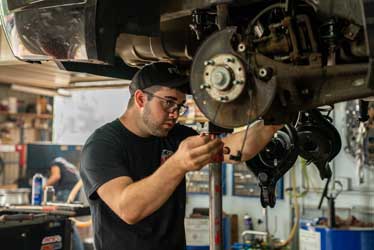All Categories
Featured

[/image]
Routine engine tune-ups are vital for keeping your car's performance, boosting gas performance, and prolonging its life expectancy. Whether you're an experienced vehicle owner or a novice, understanding the crucial elements of an engine tune-up can help you keep your auto running efficiently for years. Below are some essential tips to lead you with the process.
- Change the Flicker Plugs. Trigger plugs are little yet mighty components that play a vital role in igniting the fuel-air mix in your engine. Gradually, they can break or end up being fouled, bring about inadequate engine performance, minimized gas efficiency, and hard beginnings.
Throughout a tune-up, examine your ignition system for wear and change them as necessary. For many cars, ignition system ought to be replaced every 30,000 to 100,000 miles, depending on the type and material. Fresh spark plugs guarantee efficient combustion and smoother engine operation.
- Check and Change the Air Filter. The air filter is your engine's initial line of defense versus dirt, particles, and various other pollutants. A clogged up or filthy air filter can limit air movement, triggering your engine to function tougher and eat even more gas.
Check your air filter during a tune-up and change it if it's unclean or past its suggested service period. A tidy air filter boosts engine performance and boosts fuel economic climate.
- Check the Fuel System. In time, your fuel system can collect dust and carbon deposits, lowering engine efficiency and fuel effectiveness. Cleansing the gas injectors and gas lines throughout a tune-up assists maintain appropriate gas shipment and burning.
You can use a gas system cleaner or have an expert mechanic perform a more comprehensive cleansing. This step is especially beneficial for older automobiles or automobiles regularly driven in stop-and-go website traffic.
- Evaluate the Belts and Hoses. Belts and tubes are critical for numerous engine features, such as running the generator, water pump, and cooling. Throughout a tune-up, check for splits, fraying, or indications of wear on these components.
Change any kind of worn-out belts and tubes to avoid prospective failures. A broken belt or leaking hose can cause engine overheating or loss of power, so addressing these concerns promptly is essential.
- Change the Engine Oil and Oil Filter. Engine oil is essential for lubing moving parts, lowering rubbing, and regulating engine temperature. Gradually, oil becomes infected and loses its performance.
As part of a tune-up, change the engine oil and oil filter. Use the kind of oil recommended by your lorry's producer and stick to the recommended modification periods. Tidy oil maintains your engine running efficiently and protects against early wear.
- Examine the Battery and Billing System. A healthy battery is crucial for starting your vehicle and powering its electrical systems. During a tune-up, examine the battery's voltage and evaluate the terminals for corrosion. Clean the terminals if required and make sure a safe connection.
In addition, test the alternator and charging system to ensure your battery stays billed during procedure. If your battery is weak or old, take into consideration changing it to avoid unexpected break downs.
- Flush and Refill the Coolant. The cooling system manages your engine's temperature, stopping it from overheating. Old or contaminated coolant can shed its performance, resulting in possible engine damages.
During a tune-up, flush the old coolant and change it with a fresh combination. Inspect the radiator, thermostat, and hoses for leaks or damages. Keeping the air conditioning system in excellent problem ensures your engine runs at the best temperature level.

- Address Caution Lights and Unusual Symptoms. Modern lorries are equipped with analysis systems that signal you to prospective problems via control panel caution lights. If your check engine light or any kind of other alerting signs are on, resolve them throughout your tune-up.
Furthermore, focus on uncommon signs such as unusual sounds, rough idling, or decreased fuel efficiency. A professional mechanic can identify and solve these problems throughout the tune-up process.
- Do Not Neglect the Exhaust System. Your vehicle's exhaust system eliminates damaging gases from the engine and ensures appropriate discharges. Inspect the exhaust system for leaks, rust, or damage during a tune-up. A malfunctioning exhaust system can impact engine performance and lead to environmental and safety problems.
- Use High-Quality Parts and Fluids. When changing components or rounding off liquids throughout a tune-up, constantly go with premium products that fulfill your car's specs. Using subpar parts or wrong liquids can negatively influence your engine's efficiency and durability.
Verdict: Regular Tune-Ups Are Key to Engine Health. Making the effort to tune up your engine ensures it runs efficiently, conserves gas, and lowers the threat of breakdowns. Whether you execute these jobs yourself or count on a trusted auto mechanic, routine tune-ups are a financial investment in your lorry's dependability and longevity. Adhere to these ideas, and you'll appreciate a smoother, more reliable trip for years to come.
Latest Posts
Trustworthy Overhead Door Solutions for Homes and Companies
Selecting the Right Roof Covering Color: Effect on Energy Efficiency
Uncover Montclare Auto Repair’s Leading Car Care Solutions and Why Drivers Trust Them
More
Latest Posts
Trustworthy Overhead Door Solutions for Homes and Companies
Selecting the Right Roof Covering Color: Effect on Energy Efficiency
Uncover Montclare Auto Repair’s Leading Car Care Solutions and Why Drivers Trust Them